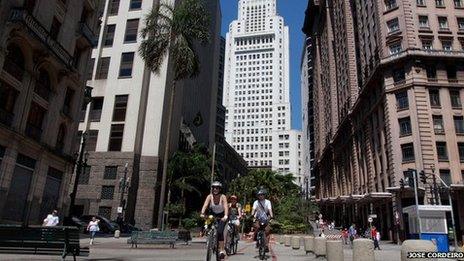World Cup 2014: Spain's stunning demise signals the end
- Published
- comments
Highlights: Spain 0-2 Chile
"Disaster", "failure" and "humiliation" were among the words used by the Spanish press after their side's World Cup title defence began with a heavy loss to the Netherlands.
Yet there is only one way to describe Wednesday's defeat at the hands of Chile, which sees Vicente Del Bosque's team eliminated with a game of the group stage still to play: the end.
The end of an unprecedented era of dominance that so captivated the global game, the end of a golden generation of players who dared, succeeded, thrilled and inspired.
Cesc Fabregas had called the Chile match "life or death" and it proved the latter. This night will go down in football history as the night the tiki-taka trailblazers bade farewell.
World Cup 2014: Highlights: Spain 1-5 Netherlands
The denouement was always going to arrive at some point, but few expected it to come with such alarming speed and in such unceremonious fashion. First-round knockout.
Reigning champions have, of course, succumbed early before - Italy in 1950 and 2010, Brazil in 1966 and France in 2002 - and losing to the Dutch and Chileans on current form is no disgrace.
The Netherlands possess attacking weapons to trouble anyone and Chile, for whom all 10 outfield starters were under the age of 30, have been tipped as dark horses for the title.
However, we are talking about Spain, the first team to lift two European Championships and a World Cup in succession.
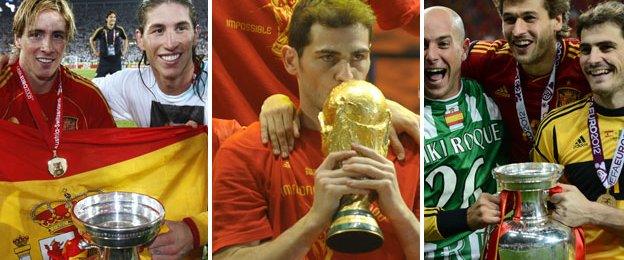
Spain won Euro 2008, World Cup 2010 and Euro 2012 to become the first side to win all three trophies in a row
Alarm bells started to ring when they were beaten by Brazil in the Confederations Cup final a year ago, also here in the Maracana. Explanations were given, judgments reserved. Then came a friendly with Chile in September that needed a stoppage-time equaliser to earn a draw.
Nor did Barcelona's poor season auger well; this is the club from where Spain take their stylistic lead, with seven of Barca's stars included in the 23-man squad and all of them featuring against the Netherlands.
Another seven came from Real Madrid and Atletico Madrid; both had impressive campaigns, but their involvement in the Champions League final made for weary legs.
"How many of the Spain players have lived up to who they are and played to their top form?" asked Crystal Palace manager Tony Pulis on BBC Radio 5 live.
"Whether that was because their season has finished later than most I'm not sure. I really wanted them to do well at this World Cup. I feel for Del Bosque - one of the great managers."
We knew when Spain landed in Brazil that they were nearing the end of a cycle and faced an incredibly difficult task to be become the first Europeans to win a World Cup in South America.
What we did not anticipate was the Dutch handing out a 5-1 drubbing, the heaviest defeat suffered by World Cup winners at the following tournament, or the Chileans dispatching them so clinically.
Spain's Sergio Busquets misses open goal
How different it might have been had David Silva not wasted a glorious chance to make it 2-0 on Friday and Sergio Busquets managed to prod into an empty net at 0-2 on Wednesday.
In all, except brief periods of the first half versus the Netherlands, Spain have looked a shadow of their old self - their control, movement and passing unrecognisable from the not too distant past.
Against Chile, they posted their lowest passing accuracy in a World Cup game (81.7%) since a quarter-final loss to South Korea in 2002 and Andres Iniesta attempted the fewest passes (52) in the eight World Cup matches in which he has played a full 90 minutes.
Spain lost 152 balls to Chile's 141, making 62 recoveries compared to 71, and despite attempting five more tackles than Jorge Sampaoli's men their success rate was 13% lower.
To watch Xabi Alonso - someone who has been at the heart of Spain's glory - resort to hacking at opponents in frustration as Los Roja failed to establish any sort of rhythm was sad.
Pre-match, the midfielder claimed the criticism of his side was "exaggerated", adding: "I don't think you can conclude that this generation is finished, we're still alive."
Team-mate Sergio Ramos had added: "We're more united than ever. To say that the cycle has come to an end is crazy."
But those words now carry a hollow ring and as Spain walked off the pitch at full-time there was little sense of shock. They looked disappointed but not distraught, more resigned to the inevitable. There was even restraint about Chile's celebrations; they triumphed with plenty left in the tank.
"What is painfully obvious watching them live is the lack of pace in the last third," said former England midfielder Danny Murphy on BBC Radio 5 live.
Del Bosque's charges have nothing to play for against Australia on 23 June and it will be interesting to see whether he makes the sort of changes that will be necessary going forward.
Iker Casillas, goalkeeper and captain, barely played for Real Madrid last season and endured a forgettable, error-ridden World Cup. Will David De Gea, 23, replace the 33-year-old?
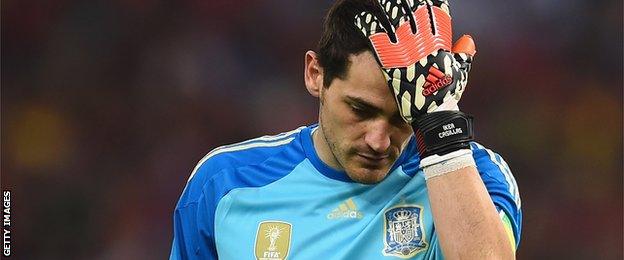
Will Iker Casillas make way for David De Gea in the final game against Australia?
Xavi, the symbol of Spain's rise and the heartbeat of their midfield for so long, was dropped for the Chile game and at 34 might never pull on the red shirt again. Koke, 22, waits in the wings as a quicker, more dynamic option with a better engine than the fading legend.
Iniesta, Xavi's partner in crime, still has a lot to give but is nowhere near top form, defender Gerard Pique was replaced by Martinez in what may be a sign of things to come, and this looks to be the end of the international road for Alonso and Villa at 32, possibly even Fernando Torres at 30.
Some potential successors await in the current squad and others outside. Spain claimed the 2013 European Under-21 Championship - the likes of Jese, Alvaro Morata, Gerard Deulofeu, Isco and Daniel Carvajal coming to the fore. Two years ago, they took a second consecutive Under-19 title.
Watch Iker Casillas's mistake lead to Chile's second goal
"Villa, Xavi, Torres, you look at the Spain team and you think there are six or seven players who could all step down," said former England defender and 5 live summariser Danny Mills.
"In players like Isco, Juan Mata and Fabregas there are still a lot of players coming through at the top level, and you also expect De Gea to be around for a long time. So Spain will come strong again but it's a big ask for the youngsters to come in and replace what was maybe an ageing squad with a little bit of complacency and a lack of desire."
From speaking to Spanish journalists, it is clear they are looking forward to a fresh start, optimistic about the future, but there is also unhappiness that the present team did not show the necessary hunger and application to make Spain's proven philosophy click as it has previously.
For Spain's approach to bear fruit, they need an impregnable defence, tireless runners and relentless hard work. None of those boxes have been ticked in Brazil.
They conceded seven goals in two games compared to just two in seven four years ago, which when you do not score many goals - another problem that requires solving - means trouble.
Del Bosque was always going to pin his hopes on this crop for one final hurrah - there is an argument that exposing youngsters to a disastrous title defence would have caused more harm than good - but why did he not shuffle the 23 more ambitiously once selected?
Key facts |
|---|
In winning Euro 2008, World Cup 2010 and Euro 2012, Spain conceded a total of six goals, one fewer than they have so far at World Cup 2014. |
Spain have conceded two or more goals in more than one game at a single World Cup tournament for the first time since USA 94. |
Spain have already conceded in their two 2014 World games (seven goals) after conceding in only two of their seven 2010 World Cup games (two goals in total). |
Spain join Italy 1950*, Brazil 1966, France 2002 and Italy 2010 as reigning World Cup champions to exit the following tournament in the group stages (*Italy 1950 was 12 years since the previous tournament and format of 1950 competition was unusual). |
Spain posted their lowest passing accuracy in a World Cup game (81.7%) since their quarter-final defeat to South Korea in June 2002 (78.7%). |
"It's difficult when the coach isn't able to perceive that the team is changing and the generation is slowing down," said Ernest Macia of Radio Catalunya. "To many people, Del Bosque was not cunning enough to retire after the last World Cup.
"He's a good manager but maybe not a good coach. He knows how to deal with egos but when the players doesn't respond you need someone who can make changes to a team that normally plays on memory. It was probably necessary to lose like this to close this beautiful and glorious era."
Del Bosque has cut a curious figure throughout Spain's short stay - edgy in his news conferences; admitting to falling asleep, exhausted, while watching Chile v Australia and waking up the next morning with the television still on; accidentally walking on to the Chile team bus as he left the Maracana.
While speculation is sure to rage over which players will retire or be cast aside, Del Bosque's achievements since being appointed in 2008 are said to guarantee his position - so any decision would come down to the 63-year-old, whose contract expires after Euro 2016.
If he does leave, there is concern over who would be available and appropriate to take over. They would have to embrace a method that is non-negotiable but must evolve because Spain have become predictable. The Dutch and Chile knew how to beat them and La Roja did not adapt.

Spanish newspaper Marca hints at the end of an era
Former England winger Chris Waddle explained: "They were two hard games for Spain and that is because teams have changed the way they play against them.
"Before, teams used to sit back and play on the counter-attack but now they play quicker than Spain, they press high up the pitch and nick the ball off them. Because Spain are not used to that, and they leave space behind with their full-backs coming on, teams are having success."
Rather than a big-name Spaniard such as Rafael Benitez, they could opt for a former player in whom Spain's chosen gameplan is engrained. The likes of Under-21 coach Albert Celades, Recreativo de Huelva boss Sergi Barjuan, Olympiacos manager Michel and Sporting Gijon's Abelardo Fernandez are all highly thought of.
But for the time being the responsibility still lies with Del Bosque.
On the morning after losing to the Netherlands, the front cover of Spanish newspaper Marca was a funeral black with the headline: "Fix this". Thursday's simply said: "The End".
- Published23 May 2014
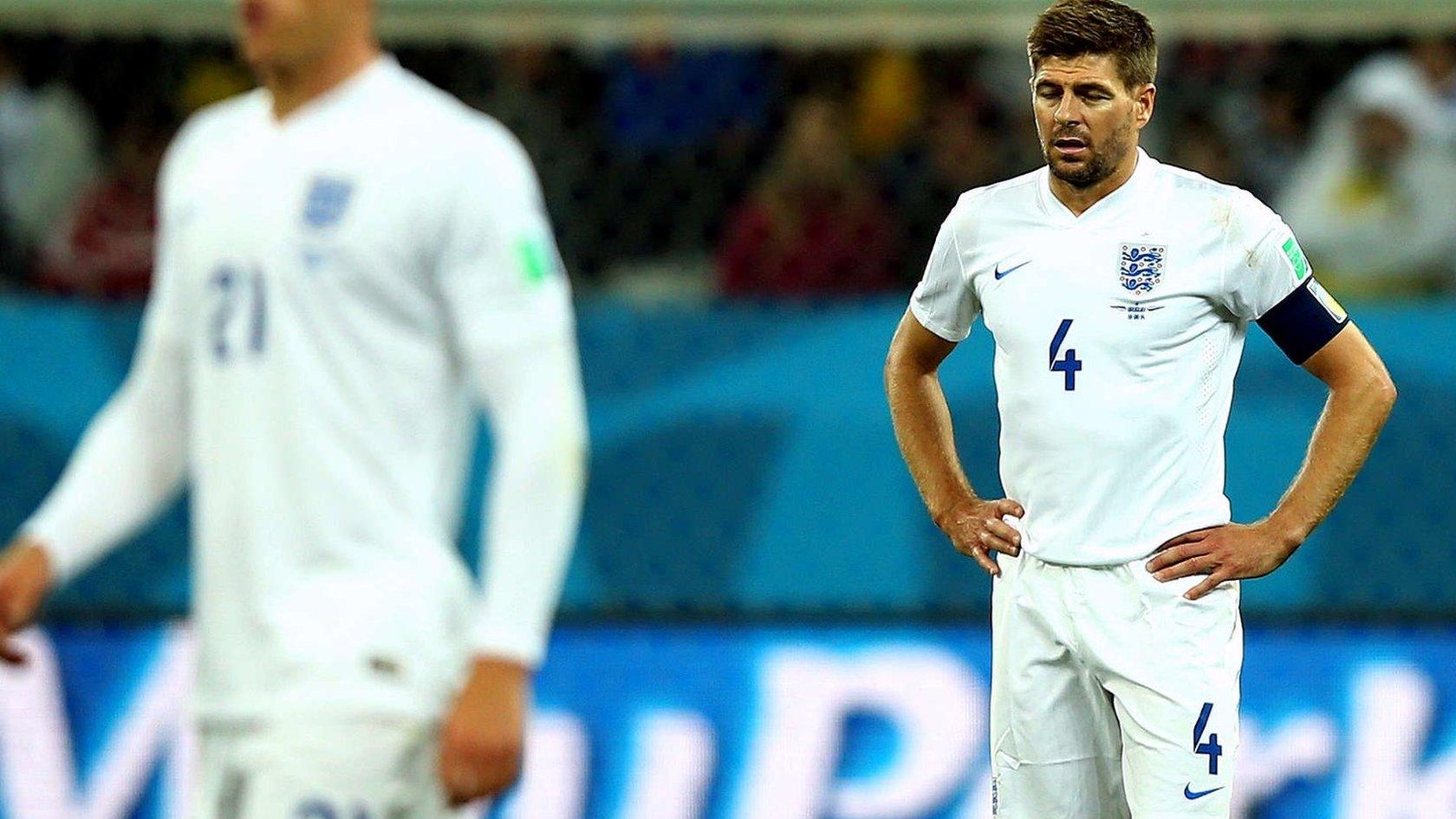
- Published23 May 2014
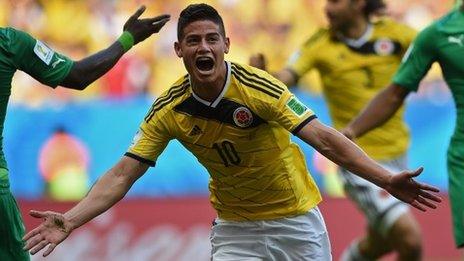
- Published19 June 2014
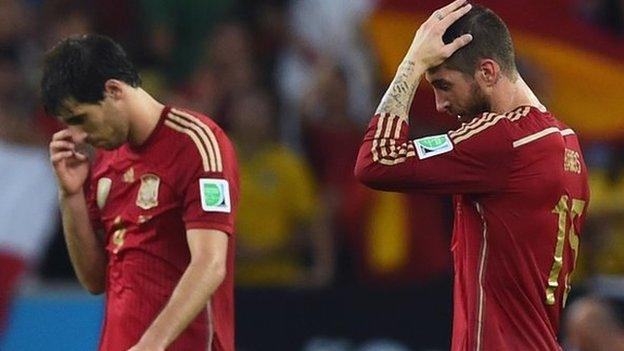
- Published6 June 2014
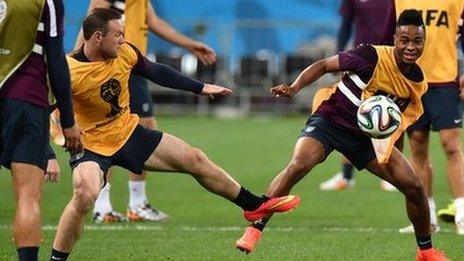
- Published23 May 2014
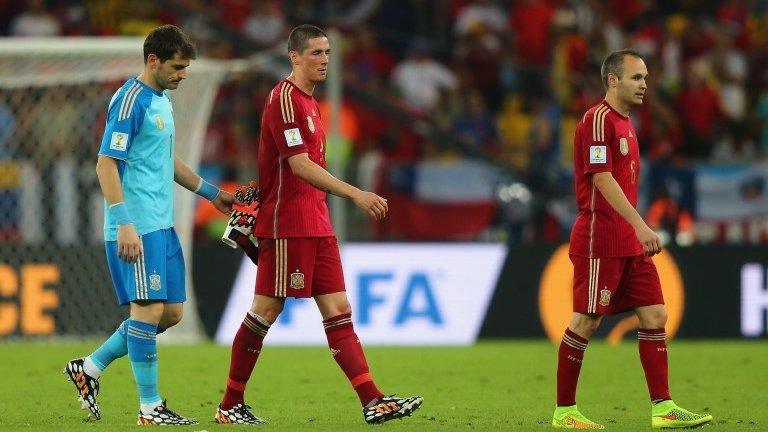
- Published18 June 2014
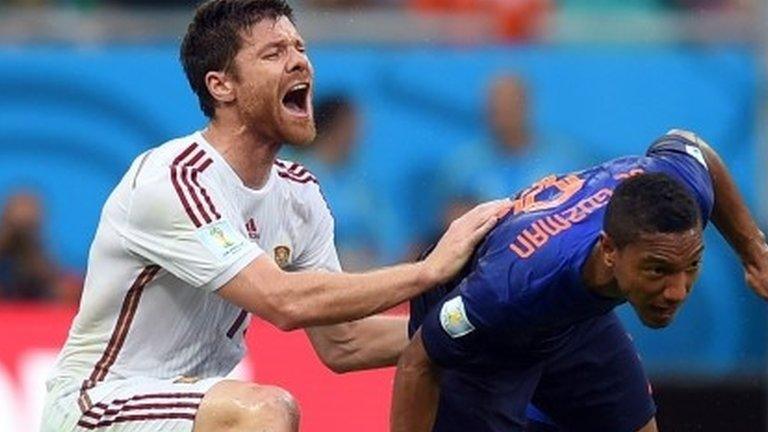
- Published14 June 2014
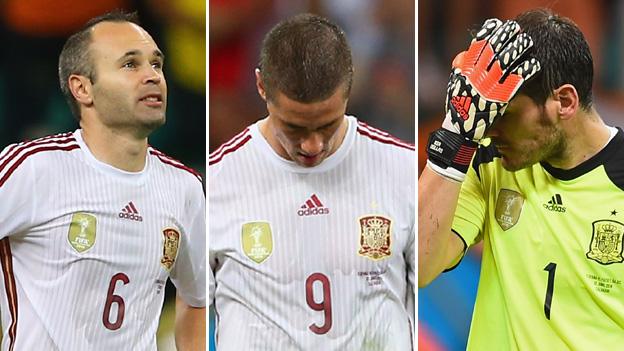
- Attribution
- Published12 June 2014
